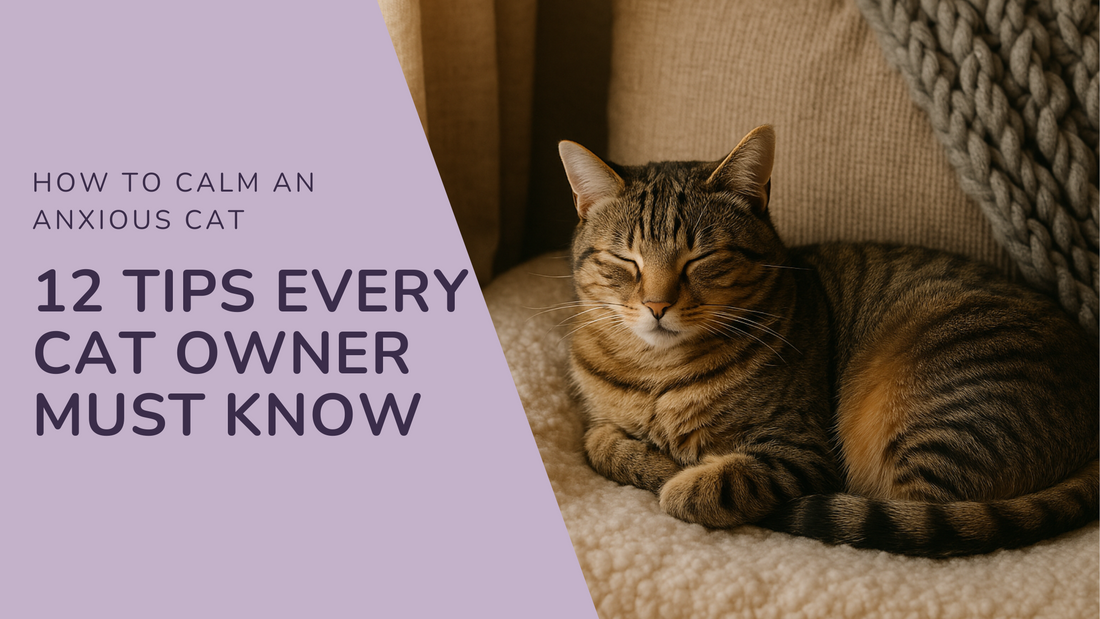Introduction: Understanding Cat Anxiety
Cats are naturally sensitive creatures, and just like humans, they can suffer from anxiety. Whether triggered by loud noises, changes in environment, or separation from their owners, cat anxiety can affect their overall health and happiness. Understanding how to calm an anxious cat is essential for every pet parent who wants their furry friend to thrive.
In this article, we’ll explore common causes, symptoms, and effective methods to reduce feline stress—from natural remedies to professional care.
What Causes Anxiety in Cats?
Environmental Changes
Moving to a new home, rearranging furniture, or introducing new pets can overwhelm cats. They thrive on familiarity, so sudden changes often trigger stress.
Loud Noises and Stress Triggers
Thunderstorms, fireworks, or even household appliances can cause extreme fear in cats.
Separation Anxiety
Some cats feel anxious when left alone for long periods. This often shows through destructive behaviors like scratching furniture or excessive meowing.
Past Trauma or Negative Experiences
Rescue cats or those with difficult pasts may carry emotional baggage that makes them more prone to anxiety.

Recognizing the Signs of Cat Anxiety
Behavioral Signs
-
Hiding frequently
-
Aggression or irritability
-
Excessive grooming
Physical Symptoms
-
Loss of appetite
-
Vomiting or diarrhea
-
Dilated pupils
Vocalization Patterns
-
Increased meowing
-
Growling or hissing
-
Crying when left alone

How to Calm an Anxious Cat Naturally
Create a Safe Space
Give your cat a quiet room with cozy bedding, scratching posts, and hiding spots. This provides comfort and security.
Use Calming Scents and Pheromones
Feline pheromone diffusers, sprays, or collars can mimic natural calming scents that reduce stress.
Provide Interactive Playtime
Engage your cat in daily play to release pent-up energy. Feather toys, laser pointers, and puzzle feeders work wonders.
Establish a Routine
Cats love predictability. Feeding, playtime, and sleeping schedules should remain consistent.
Gentle Touch and Bonding
Spend quality time petting your cat softly. Slow blinking (known as a “cat kiss”) helps reassure them.

Preventing Anxiety in Cats
Early Socialization
Introduce kittens to various environments, people, and pets early to build resilience.
Consistent Environment
Avoid frequent changes in the household to keep your cat grounded.
Enrichment and Mental Stimulation
Provide scratching posts, window perches, and toys that stimulate their hunting instincts.
Professional Help for Severe Cat Anxiety
When to Consult a Veterinarian
If your cat’s anxiety is severe and persistent, it’s best to seek professional advice. A vet can rule out medical conditions that mimic stress.
Medications and Therapies
In extreme cases, vets may prescribe anti-anxiety medications or recommend behavioral therapy.

FAQs About Calming Anxious Cats
1. How can I instantly calm my anxious cat?
Offer a quiet, dimly lit space and use calming product like StayPurr Hideaway Tunnel Bed.
2. Do cats grow out of anxiety?
Some cats may adapt over time, but many need consistent support and training.
3. Can music help calm my cat?
Yes, soft classical or cat-specific music can reduce stress.
4. Should I ignore my cat when it’s anxious?
No, comfort them gently but avoid overwhelming them with too much attention.
5. Are essential oils safe for calming cats?
Many essential oils are toxic to cats. Stick to vet-approved calming solutions.
6. Can diet affect cat anxiety?
Yes, certain calming diets or supplements rich in L-theanine and tryptophan may help.
Conclusion: Helping Your Cat Live Calm and Happy
Learning how to calm an anxious cat requires patience, consistency, and love. By recognizing triggers, creating a safe environment, and offering natural remedies, you can help your feline feel secure. In severe cases, consulting a vet ensures your cat receives the right treatment.
Your cat deserves a stress-free, happy life, and with the right approach, you can give them just that.
For more information on feline behavior, visit ASPCA’s cat care guide.

